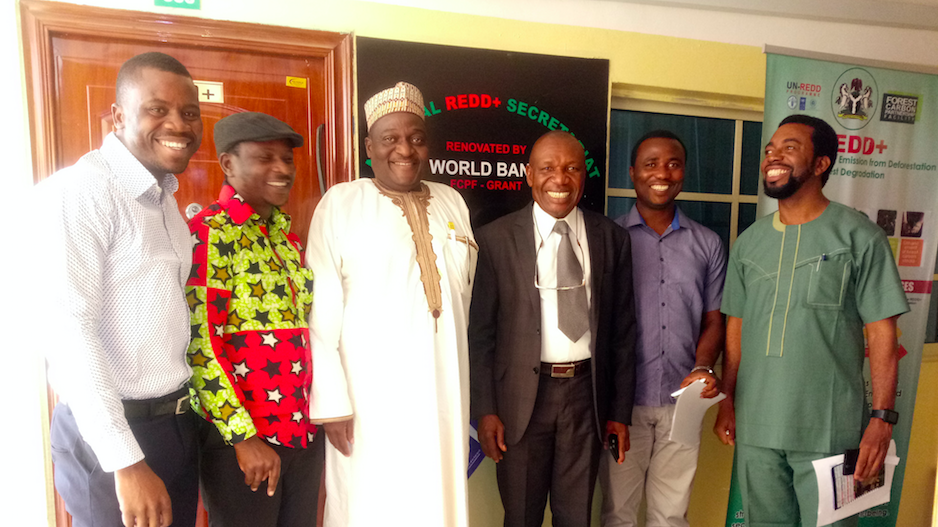
By Pius Oko
Civil society groups in Nigeria under the umbrella of Climate and Sustainable Development Network (CSDevNet) have restated their commitment to collaborate more assiduously with the government in order to achieve Nigeria’s targets for the UN Programme on Reducing Emission from Deforestation and Degraded Forests (REDD+).
This was disclosed today during a high-level visit by the Network to Nigeria’s REDD+ office in Abuja. The visit held as part of the inception activities for the commencement of its World Bank funded FCPF project in Cross River and Ondo states. Led by Dr Ibrahim Choji (mni), Chair of the Network’s Board of Trustees, the civil society groups hinged their readiness on the need to create workable and seamless flow of interactions between the government and the forest dependent communities in Nigeria. This according to Dr. Choji, “is with a view to eliminating friction, needless suspicion and build the capacity of forest-dependent communities to engage in the UN REDD process.”
Dr. Choji further urged the Nigeria REDD+ Programme to always ensure strict adherence to the principles of equity and free, prior and informed consent that underpins the mechanism as a way of engendering the collaboration and participation of a larger section of non-state actors in Nigeria.
Recalling CSDevNet’s longstanding commitment to Nigerian forests and its relationship with the REDD+ Programme, the civil society leader pledged to reinvigorate the REDD+ Media Network it established in 2013 as well as the Nigerian Civil Society Framework on Paris Agreement and the SDGs (NCSFPAS) which was midwifed into existence in August 2018 with support from Swedish International Development Agency (SIDA) to support Nigeria’s REDD+ programme.
Responding, the Nigeria REDD+ Programme Coordinator, Dr. Moses Ama welcomed the collaboration and applauded the civil society network for taking the right step in aligning with the National REDD+ secretariat for much needed collaboration, as experience sharing is key to achieving such a huge task. Dr Ama also assured the CSDevNet’s team of his secretariat’s support for the effective implementation of set plans which have already been shared with the REDD+ secretariat.
Stressing on the importance of experience sharing, Dr. Ama pointed out the case of Ekuri, a forest dependent community in Cross River State that is already considered as a forerunner in the REDD+ process. In a community like Ekuri, capacity building and mobilisation would be very strategic to meeting set objecives,” Dr Ama added. He called for more collaboration and civil society support for the Nigeria REDD+ processes as well as the country’s ambitious efforts at forest conservation, climate change adaptation and community development.
CSDevNet is the Nigerian chapter of Pan African Climate Justice Alliance (PACJA) and a coordinating organisation to several other regional and international groupings that are relevant to its core objectives. The Network brings together organizations, comprising grassroots community practitioners, youth, media, women and faith-based organizations to commonly promote and advocate pro-poor, climate-friendly and equity-based responses to climate change.
Reducing emissions from deforestation and forest degradation (REDD+) is primarily a market-based mechanism for achieving the effective reduction of carbon emissions from forests. The UN-REDD Programme is the United Nations collaborative initiative on Reducing Emissions from Deforestation and forest Degradation (REDD) in developing countries. The Programme was launched in 2008 and builds on the convening role and technical expertise of the Food and Agriculture Organization of the United Nations (FAO), the United Nations Development Programme (UNDP) and the United Nations Environment Programme (UNEP).
The UN-REDD Programme supports nationally-led REDD+ processes and promotes the informed and meaningful involvement of all stakeholders, including Indigenous Peoples and other forest-dependent communities, in national and international REDD+ implementation
